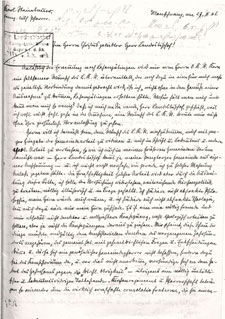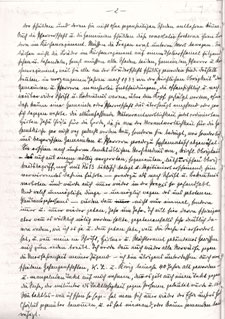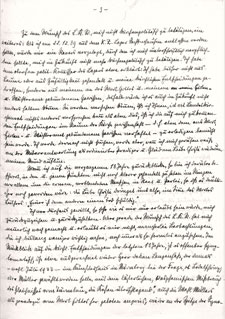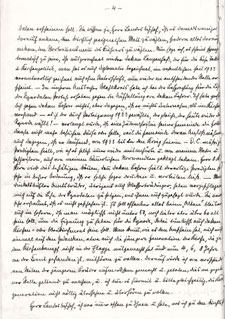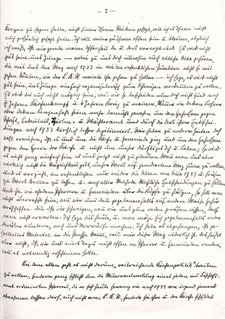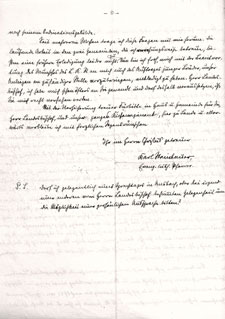An Uncomfortable Admonisher
Karl Steinbauer was released from captivity in Marseille at the end of September of 1945. He received a call to a parish in Lehengütingen near Dinkelsbühl in 1946. The differing views between the church government and Steinbauer became evident once again on the occasion of this call. The direct cause was a letter of January 31, 1946 from Georg Kern (1885–1947), a member of the high consistory, urging Steinbauer to devote himself to his new parish with all his soul and to take advantage of the quiet of the place to diligently deepen his study of scripture and the confession. Above all, however, Kern admonished Steinbauer to recognize the temptation to pursue church politics extensively, which you seize you as a result of your entire prior experience, as such (K. Steinbauer, Zeugnis 4, 194f).
Steinbauer reacted to this admonition with outrage. In his reply to Regional Bishop Hans Meiser (1881–1956), he explained, I find it an utterly strange and absolutely inconceivable and incomprehensible consequence to be supposed to work theologically but not to draw the consequences from this at all. It appears to me that this view of things would ultimately have to belong to the consistorial thinking of the past century, which held that an ordinary parish pastor could not and was not allowed to concern himself with churchwide issues and decisions, but rather that the consistory was there for that and whoever did not acknowledge this sinned against the commandment of obedience to the “ecclesiastical authorities”.
Steinbauer also blamed the church government’s wrong decisions during the Nazi on the utterly distorted so-called “Lutheran” understanding of authority common in the Bavarian regional church: This had enabled the “ecclesiastical authorities” in years past after 1933 to put a number of decisions, which were obviously and demonstrably against Scripture and the confession, over on parishes and pastors without hardly any parish or clergy sensing or resisting this at all. And what impossible things – impossible because of the obedience of faith demanded of us – were done not just once, but rather again and again: year after year.
Steinbauer announced that he would no more promise to remain silent now than when he had been released from Sachsenhausen concentration camp in December of 1939: You will understand that I cannot promise you, id est the regional church consistory, anything other than just that I will make every effort to deal with the decisions coming upon me in the sphere of the church conscientiously, i.e. captive to my very conscience bound to scripture and the office of pastor and guardian. Maintaining that he had intended to hold back until then, he stated that precisely the regional church consistory’s admonition would not allow him to continue considering a number of observations, which I hitherto took less seriously, to be so harmless.
In particular, these observations of Steinbauer’s included appointments in the church’s leadership and the church government’s staffing policy for the regional synod. Steinbauer’s younger, critical generation had been excluded deliberately. For the future, he announced, If one really does not intend to give us the opportunity to hear our word through a proper channel and prefers to allow essentially only the old men of anno 1933 and earlier to have a say again and to make ecclesiastical decisions in keeping with the old ecclesiastical method and to put them over on pastors and parishes as in former times, then one ought not to be surprised if we then make ourselves heard another way if necessary.
Steinbauer remained true to his conscience bound only by God’s word and his office of a pastor and guardian all his life. In keeping with his announcement to Regional Bishop Meiser, he also remained an uncomfortable admonisher of the church government as a camp chaplain in Moosburg (1947-48), the parish pastor in Wolfratshausen (from 1951 onward), in Pettendorf near Bayreuth (from 1962 from) and in Amberg (from 1967 onward) and as a very busy speaker in retirement (from 1971 from). The regional church consistory bestowed the honorary title of “member of the church consistory” on him in 1964. He returned it since he found it unbearable after his experiences of the preceding months (letter of February 2, 1966 to the regional church office: K. Steinbauer, Zeugnis 4, 298). Karl Steinbauer died on February 6, 1988 and was buried in in Uttenreuth near Erlangen.
Source / title
- © Landeskirchliches Archiv Nürnberg, LKR 50071 Steinbauer Karl

